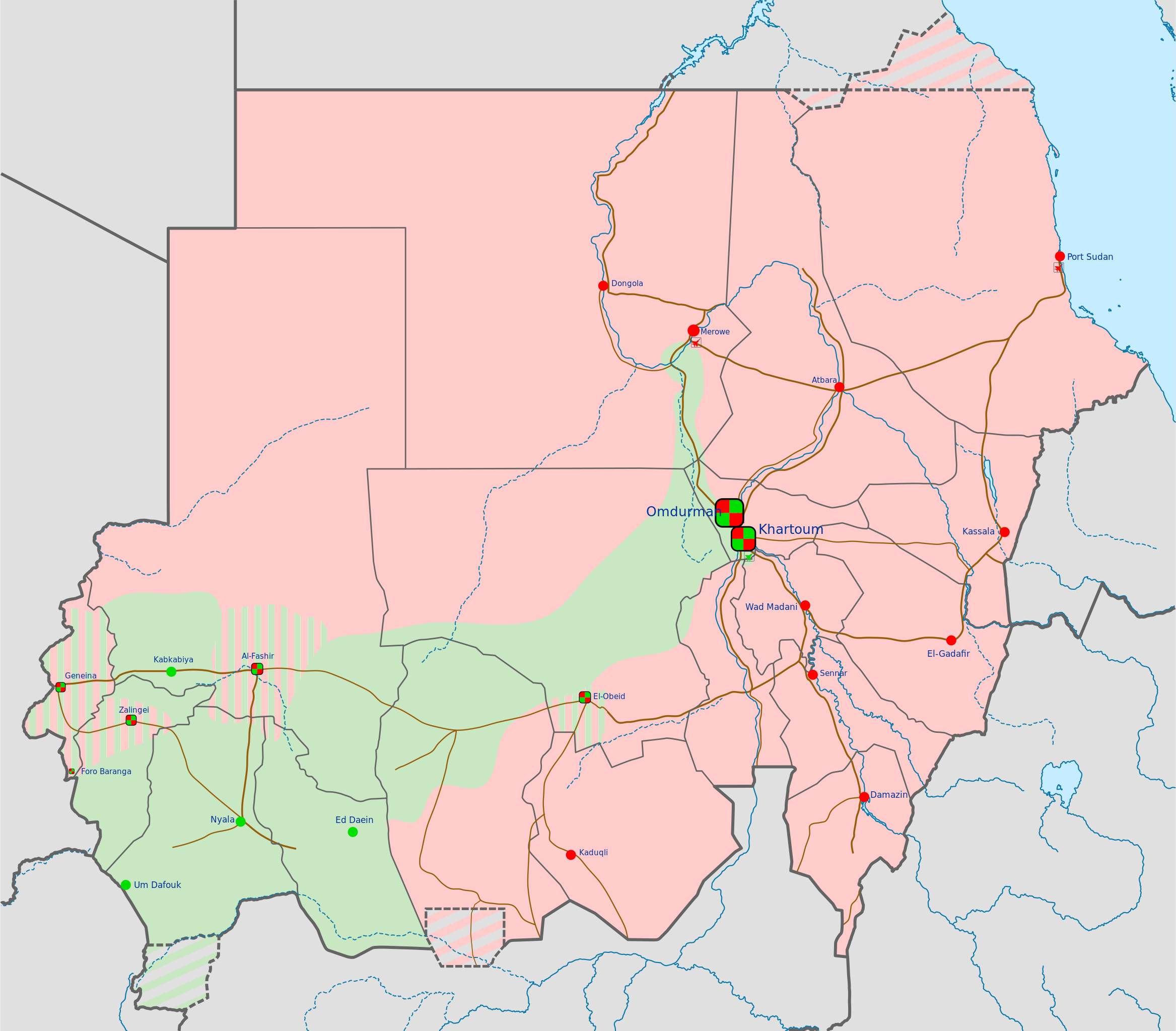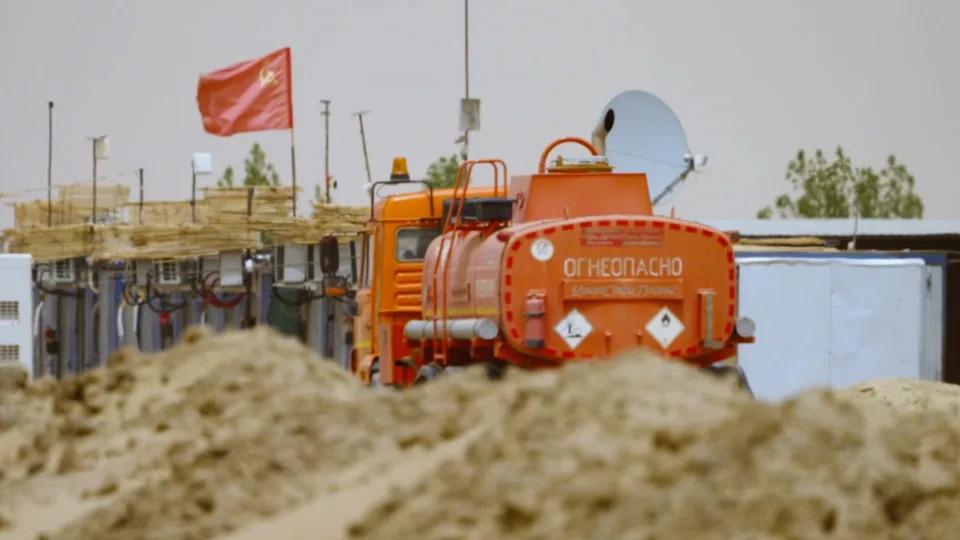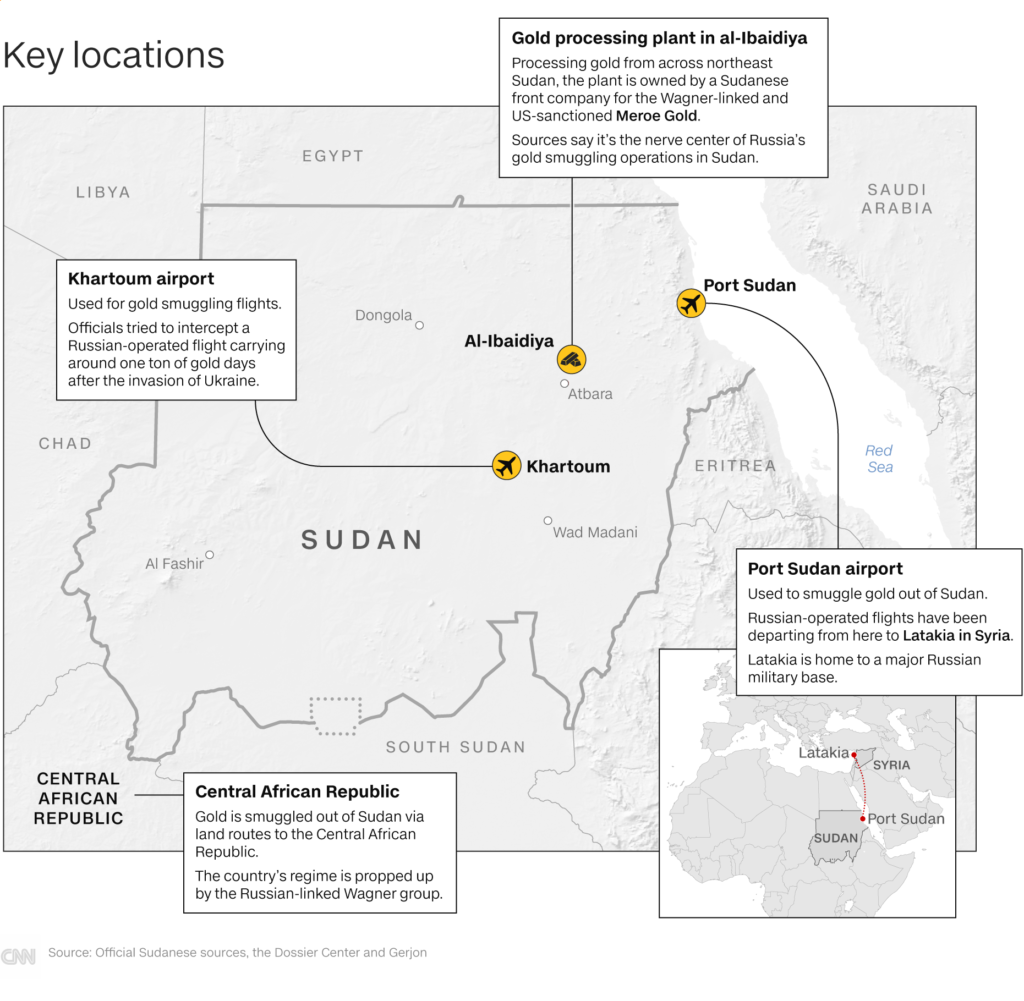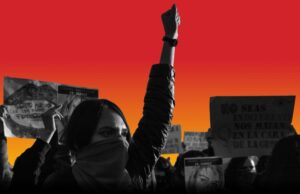
Sudan, a war-torn country
Image: The war in Sudan on 28th of April
Red: territory controlled by the Sudanese Armed Forces
Green: territory controlled by the Rapid Support Forces; Source: Wikipedia
In modern times, in the 19th century, Sudan was subordinated to the reign of the Ottoman empire. In the 1880’s an 1890’s it saw a short period of partially successful rebellion led by Mahdi Muhammad Ahmad, who tried to expand into Ethiopia, Egypt, Equatoria and Eritrea. The Madhist ambitions were crushed by the British, Belgians and Italians. Due to the rivalry between the French, Belgians and the British on the Nile’s headwaters British imperialism decided to rush forward, defeating the Madhist Sudan and establishing a British colony formally led by an Egyptian puppet in 1899. Anyhow Sudanese resistance lasted until 1905. In the aftermath of the First World War British imperialism took another approach than the Egyptian-Sudanese unity, basing their rule on a division of Sudan into a northern and a southern part. During the Second World War Sudan was faced with Italian ambitions and advance, which was repelled by the Sudanese armed forces themselves. In conjunction with the decline of the British Empire and the rule of Nasser following the Egyptian upheaval, Sudan was granted formal independence in 1956. From 1955 until 1972 the First Sudanese Civil War took place in which the social-imperialist Soviet Union interfered as the only mayor imperialist power. The late 1960’s and early 1970’s brought Sudan several (attempted) coups leading the semi-colonial Sudan under the thumb of Yankee imperialism. The Second Sudanese Civil War, 1983 to 2005, alike a struggle for the redistribution of the booty, saw China and Russia, by means of Iraq and Iran, on the one side and the USA, by the means of Israel, on the other.
In 1993 Omar al-Bashir became head of the regime. In the first period of his reign Sudan harbored among others the leader of al-Qaida, Usama bin-Laden. In August 1998 US President Bill Clinton ordered operation “Infinite reach” and Sudan was bombed with several cruise missiles by the Yankees, along with Afghanistan, as a revenge for the bombings of the United States embassies in Nairobi, Kenya and Dar es Salam, Tanzania. They also blamed Sudan for the attack on the USS Cole, in the port of Aden, Yemen, in the year 2000. The Yankees accompanied by their “western” allies campaigned to slender Sudan being a supporter of terrorism. In these regards the independence of South Sudan 2011 and the following war in South Sudan in 2013, as well as the war and genocide in Dafur must be understood as this – a struggle for the redistribution of the booty.
In April 2019, the military stated a coup against President Omar al-Bashir after his nearly 30 years in power. Previously there was an uprising of the masses due to shortages and price-risings. The people of Sudan rose in just rebellion and the so-called Sovereignty Council was the reactionary way out, wherein the military shared power with alleged representatives of the so-called social movements. The transitional government abruptly implemented several reforms in order to fulfill agreements with the International Monetary Fund, which must be recognized as tool principally of US-Imperialism. The Sudanese transitional government paused plans to establish the Russian naval base at the Red Sea in April 2021, due to US pressure and in September an anti-corruption committee of the transitional government stopped the transfer of holdings from “Meroe Gold” (a subsidiary of the Russian “M-Invest” company) to “al-Solag”. Later on we will come back to the gold issue.
This “power-sharing” agreement was then nulled by another coup of the military, one month later, in October 2021, so to get rid of the ‘civilian part’ and probably of the Yankees interference. US officials publicly alleged Russia of actively supporting Sudan’s 2021 military coup which overthrew that transitional government. The new junta immediately dismantled the anti-corruption committee and received military training and intelligence support from Russia which benefits mainly from Sudan’s gold.
At the head of the junta two individuals are most notably: General Abdel Fattah al-Burhan, who leads the Sudanese Army, and Lt. Gen. Mohamed Hamdan Dagalo, the leader of the Rapid Support Forces (RSF) paramilitaries.
Both al-Burhan and Dagalo have ties to Russia. The two generals helped Russian President Vladimir Putin to continue to exploit Sudan’s gold resources to help buttress Russian finances against Western sanctions and fund his war in Ukraine. Dagalo also received Russian military training. In return for their cooperation, Russia provided military and political backing to help the two generals obstruct Sudan’s “pro-democracy”, meaning pro-Yankee, movement and the peoples of Sudan. For example Russia’s infamous Wagner Group, the Kremlin-backed mercenaries, obtained valuable gold mining concessions in Sudan and partnered with Dagalo.
At the heart of this quid pro quo between Moscow and Khartoum is Yevgeny Prigozhin, a Russian oligarch and key ally of President Vladimir Putin. In Sudan, Prigozhin’s main vehicle is a US-sanctioned company called Meroe Gold – a subsidiary of Prigozhin owned M-invest – which extracts gold while providing weapons and training to the country’s army and paramilitaries. Wagner operative, Alexander Sergeyevich Kuznetsov, has overseen operations in Sudan’s key gold mining, processing and transit sites in recent years. The hub of Russia’s gold extraction operation lies deep in the desert of northeast Sudan, al-Ibaidiya – known as ‘gold town’. A key Russian processing plant some five miles from al-Ibaidiya is know as the “Russian company”, but is the Sudanese company called al-Solag. At least 16 known Russian gold smuggling flights were done out of Sudan in 2021 and 2022 via the Syrian port city of Latakia where Russia has a major airbase. They use also a land route to the Central African Republic, where Wagner has one of its strongholds. Anyway Sudan’s official Foreign Trade Statistics since 2011 consistently list Russia’s total gold exports from the country at zero. At least 32.7 tons was unaccounted for in 2021. Approximately up to two billion US dollar of worth.


The route of Sudanese gold to Russia; Source: CNN
On the very day Russia invaded Ukraine, Dagalo led a Sudanese delegation in Moscow to “advance relations”. In July 2022 Yankee press cheered that Russia’s hopes of establishing a naval base at Port Sudan on the Red Sea, one of the world’s busiest waterways, “have run aground”. But lately, in February 2023 an agreement was finalized that allows Russia to set up the naval base with up to 300 Russian troops, and to simultaneously keep up to four navy ships, including nuclear-powered ones, ensuring the Russian navy’s presence in the Red Sea and the Indian Ocean, the latter playing a key role in the new Russian naval doctrine. The same February the US pressured to expel Russia’s Wagner Mercenaries from Libya and Sudan. For months they pushed on Egypt and the United Arab Emirates to pressure military leaders in Sudan and Libya to end their ties with the Wagner Group. The issue was central in talks between CIA director William Burns and officials in Egypt and Libya in January this year. Secretary of State Antony Blinken also discussed with Egyptian President Abdel Fattah el-Sissi in a late-January trip to Cairo. A lot of imperialist rivalry in the 3rd largest country in Africa.
Additionally al-Burhan and Dagalo have personal issues and have been jockeying for control since the two seized power in 2021. Leading to tensions between the RSF and Sudan’s armed forces. This dispute is over the formation of a new military as the country strive towards a non-military rule. Despite their alliance early on, al-Burhan and Dagolo clashed over efforts to merge the Rapid Response Forces into the Sudan army, and who would then lead this new military and different positions in the negotiations on the transition to “civilian rule”.
Mohammed ‘Hemedti’ Hamdan Dagolo heads the most powerful paramilitary force in Sudan. A militia named the Rapid Support Forces (RSF). Dagolo was vice chair of the Sovereignty Council of the previous government. He became notorious in 2003 as one of the leaders of the Janjaweed, a paramilitary force deployed then in Darfur which conducted the genocide on large scale – more than 300,000 were killed, millions displaced. He also was responsible for slaughtering a peaceful sit-in protest in 2010 in Khartoum, butchering more than a hundred people. In 2013 Dagolo led the newly-formed Rapid Support Forces in fighting again Darfuri rebels and killing the people. Since then he established a parallel structure to the regular military reporting first to the services and then directly to al-Bashir. He took over the Jebel Amer gold mines in Darfur in November 2017, running the major gold trading company Al Gunade or Al Junaid. The Al Gunade gold company is formally owned by three members of the Dagolo family: Hemedti’s brother, Abdul Rahim Hamdan Dagolo, and Abdul Rahim’s two young sons, while Hemedti himself is or was on the Board of Directors of the enterprise. Abdul Rahim Dagolo is deputy head of the RSF and personally gave the order to clear the Khartoum sit-in mentioned. Via Al Gunade the RSF has strong ties to Chinese social imperialism. The company owns the only large concession operational in Darfur, in the vicinity of Jebel Amer. The region has some the largest mineral and gold reserves in the country, according to the Ministry of Minerals. Al Gunade is also active in South Kordofan, as well as in northern Sudan, Abu Hamad and Alabidia. There protests by local people in the town of Talodi, South Kordofan against the excessive use of mercury contamination around Al Gunade mine sites led to a heavy handed response from the RSF. In that way Dagolo and his family control large parts of the gold market in Sudan most interesting for Russian imperialism.
Two RSF front companies, “GSK”, a small technology and security company, and Tradive General Trading LLC, based in the UAE. They are both controlled by one of Hemedti’s younger brothers. His brother, Algoney Hamdan Dagolo, is a director and an ultimate beneficial owner of Tradive. Tradive seems to have funneled money into the RSF, while individuals associated with GSK are involved in the RSF’s procurement process. The RSF also appears to have close financial ties with Al Gunade. The RSF runs an account at the National Bank of Abu Dhabi (now part of First Abu Dhabi Bank). Tradive itself holds an account at the Sudanese El Nilein bank in Abu Dhabi. In total, the RSF seems to have paid over 9 million dirhams (2.5 million US dollar) to companies overseas via a network of procurement agents in countries including the UAE, Rwanda, Malaysia and China. Individuals within the network also made visits to Germany, Russia, and the Netherlands. The RSF receives also money for their mercenaries fighting in Yemen, paid by the UAE.
Dagolo handed over one billion US dollar to help stabilize the Sudanese Central Bank in the aftermath of the economic crisis and protests which led up to the ousting of President al-Bashir. The Dagolo clan and the RSF are buying and distributing essential resources like petrol, wheat, medication.
Even though the regime as a whole, as the previous one of al-Bashir, could correctly be considered as a Russian lackey, and Sudan being a semi-colony mainly of Russian imperialism, the Dagolo clan and Mohammed Hamdan Dagolo at its head impersonates this interrelation, as it was shown. He was the one who started the clashes on April 15, 2023, in western Sudan, in the capital Khartoum and in the Darfur region.
Due to the described circumstances, especially the interference of the Yankees on the planed Russian Red Sea Naval Base and the presence of Wagner mercenaries, it seems most probable that Russian imperialism wanted to set the record straight and install their most loyal lackey as the unquestioned head of state. The US Center for Strategic & International Studies alleged Russia to “shape a political future conducive to their own interests”.
But the Yankees are not completely off-side and are trying to gain ground. The Yankee think tank “foreign policy” most open declared: “Hemeti’s Rise in Sudan Is a Threat to Regional Stability. Countries that prefer peace to chaos should hope for a quick army victory over the RSF.” With no immediate successes on any side the USA were able to maneuver, resulting in an agreement of a ceasefire on April 24, officially announced by Anthony Blinken. The three-day ceasefire brought about a lull in fighting, without completely halting it. In charge of pushing forward the negotiations is now the Intergovernmental Authority on Development (IGAD), an organisation of several African countries. It stated there should be a truce at least until April 30 and South Sudanese President Salva Kiir on Wednesday invited the rivaling generals. South Sudan shows all signs of being a semi-colony mainly of Yankee imperialism, the IGAD is directly paid by the Yankee’s USAID. From 2016 to 2021 the USA transferred more than 5 million US dollar to the IGAD. Al-Burhan, had given initial approval to a plan to extend the truce for another 72 hours. A statement said, “Burhan thanked the IGAD and expressed an initial approval”. Antony Blinken and Moussa Faki Mahamat, the Chairman of the African Union Commission discussed the issue likewise. It seems that the Yankees are either trying to win some time by these negotiations and/or preparing an intervention by their loyal proxies in Africa.

